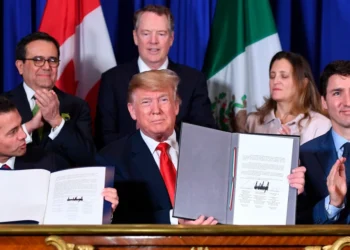Montana is the first jurisdiction in the United States to prohibit TikTok on personal devices.
TikTok, which is owned by the Chinese company ByteDance, has been accused of posing a threat to national security by collecting user data.
If Governor Greg Gianforte signs the bill into law, the prohibition could go into effect in January.
The company has indicated that it will pursue legal action against the Montana legislation.
By a vote of 54 to 43, Senate Bill 419 was ratified. It cites a number of concerns regarding TikTok, including alleged Chinese government surveillance.
It also refers to the encouragement of “dangerous activities” among juvenile app users, such as “throwing objects at moving vehicles” or “lighting a mirror on fire and then attempting to put it out using only one’s body.”
The legislation prohibits app stores from offering TikTok. Those who already have TikTok are not prohibited from using it.
Violations of the bill could incur a penalty of up to $10,000 (£8,000), which would be enforced by Montana’s Department of Justice. The penalties are imposed on businesses, not individual users.
Mr. Gianforte, a Republican who previously prohibited the app on government employees’ devices, is anticipated to sign it.
A spokesperson for TikTok stated in a statement that the “bill’s champions have admitted that they have no feasible plan for implementing this attempt to censor American voices and that the constitutionality of the bill will be decided by the courts.”
“We will continue to fight for TikTok users and creators in Montana whose livelihoods and First Amendment rights are threatened by this egregious government overreach,” the spokesperson added.
Governments around the globe, including the United States, have moved to restrict the use of TikTok on official devices by government employees.
In March, US President Biden warned ByteDance that it could face a federal ban if it does not sell its ownership stake in the app.
While there is no evidence that TikTok misused the personal information of US users, FBI Director Christopher Wray told a Senate subcommittee in March that the app “screams” security concerns.
He also added that authorities are “uncertain that we would observe many of the outward signs if it were occurring.”
Additionally, industry groups have criticised Montana’s legislation and comparable efforts to limit access to the app.
CBS quoted Carl Szabo, vice-president and general counsel of NetChoice, an industry group that includes TikTok, as saying that the bill “sets a dangerous precedent that the government can try to ban any business it doesn’t like without clear evidence of wrongdoing.”













































